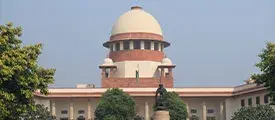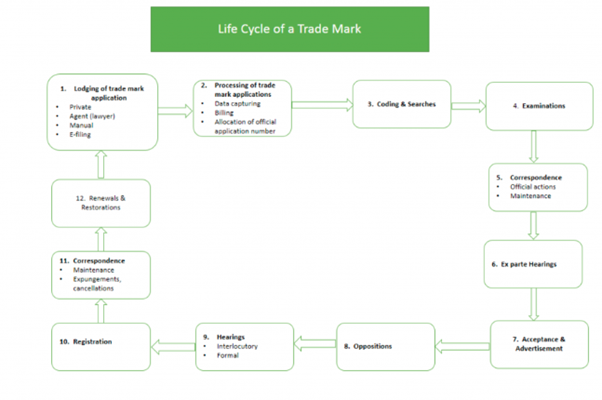TRADEMARKS FILING AND PROSECUTION IN SOUTH AFRICA
A trade mark is a brand name, a slogan or a logo. It identifies the services or goods of one person and distinguishes it from the goods and services of another. Thus a brand name is a word or combination of words. A slogan is a short phrase or a sentence, and a logo is a distinctive picture or symbol. They provide a distinctive identity in the marketplace and can apply to both products and services.
When a trade mark (brand name, slogan or logo) has been registered, nobody else can use this trade mark, or one that is confusingly similar. If this happens, legal action may result.
Trademark in South Africa may be designated by the following symbols:
- ® (for a registered trademark)
- ™ (for an unregistered trademark)
A trademark is typically a name, word, phrase, logo, symbol, design, image, or a combination of these elements. There is also a range of non-conventional trademarks comprising marks which do not fall into these standards categories, such as those based on colour, smell, or sound.
A trademark provides protection to the owner of the mark by ensuring the exclusive right to use it to identify goods or services, or to authorize another to use it in return for payment. Trademark protection also hinders the efforts of unfair competitors, such as counterfeiters, to use similar distinctive signs to market inferior or different products or services.
The owner of the registered trademark may initiate legal proceedings for trademark infringement to prevent unauthorized use of that trademark, and can license it to the third parties, sell it in return of sum, use it raise equity for business undertakings.
| Relevant office | Companies and Intellectual Property Commission (CIPC) |
| Filing principle | First-to-use |
| Nice classification | Yes |
| Paris convention | Yes |
| Madrid system | Not a member |
| Filing system | Single- class filing system |
| Documents required for filing a trade mark application | Power of Attorney simply signed Certified copy of the priority document if claimed, with English translation. Note: The priority document can be filed within three months from the filing date. |
| Requirements Details for filing | Name and address of the applicant, clear representation of the trademark, list of goods and/or services. |
| Prosecution process | Filing, Examination, Publication of the mark in the trade mark journal opposition (within 3 months after the publication date) registration renewal |
| Registration term | 10 years from the date of registration |
| Renewal term | 10 years |
Trademark searches in South Africa
It is advisable that the mark to be searched before the application is filed with Companies and Intellectual Property Commission in South Africa.
A search has to be conducted to make sure there is no similar or identical trademark on the register preventing the registration of the trademark.
A trademark search in South Africa can be conducted for word mark, logo, etc. A special search can be conducted at the records of the Companies and Intellectual Property Commission in South Africa. The purpose of a special (preliminary) search in the Trade Marks Register will provide an indication of whether there are existing trademarks which are identical or similar to the one applied.
However, the official search is not mandatory but will help to determine if the mark you may wish to use is indeed available to you.
They also encourages you to conduct a similar mark search on an e-service portal of Companies and Intellectual Property Commission (CIPC) to ensure that there is no similar trademark existing on the register which is identical or similar to applicant’s trademark.
Trademark word search edition of South Africa follows the Nice Classification and trademark applications can be filed for goods in classes 1-34 and services in classes 35-45.
It is advisable to conduct comprehensive trademark clearance search in South Africa to ascertain availability of the proposed mark and also to overcome any objection and opposition with respect to mark later on.
Along with trademark search, it is also advisable to do a comprehensive company search and domain search of the proposed trademark in South Africa. The device marks include individual marks such as stylized letters, numerals, shapes, plants, celestial bodies, living creatures etc. or combination of marks containing device marks. A device mark search in South Africa can be conducted amongst the marks filed and registered as per the Vienna code classification.
Filing trademark applications in South Africa
A person may file single class trademark application in South Africa.
Trademark application can be filed in the following categories:
- Ordinary Applications
- Convention application (claiming priority from a convention country)
Ordinary application in South Africa
Ordinary trademark applications filed in South Africa are applications without claiming any priority. Only single class filing system is followed in South Africa. However, the trademarks act also lays down provisions regarding the filing of priority applications, wherein priority of the mark can be claimed in the said mark filed in a convention country.
Priority trademark applications in South Africa /Convention trademark applications South Africa:
A priority trademark application may be filed in South Africa. A priority trademark application should be filed in South Africa within 6 months after the date on which the application was made in the convention country.
Paris convention
The Paris Convention for the Protection of Industrial Property, signed in Paris, France, on March 20, 1883, established a Union for the protection of industrial property. It offers national treatment to the applicant residing in the member country of the union, in other words. National treatment is a very important concept and is essential for successfully achieving the fundamental aim of the Paris Convention. The idea is to provide equal treatment to applications from member countries, in a given member country and not to differentiate between the nationals of member countries for the purpose of grant, and protection of industrial property. Priority application can be filed in South Africa within six months of after the date on which the application was made in the Convention Countries.
Trademark classes for goods and services
South Africa follows the nice classification of classes. Companies and Intellectual Property Commission (CIPC) uses the NICE classification of classes that groups together similar goods or services into 45 different classes. Classes 1 to 34 are assigned for the goods and classes 35 to 45 are assigned for the services. Each class contains well defines list of terms and cover all the goods and services.
The intellectual property office of South Africa provides an online service for goods/services name search according to nice classification for quick overview about the certain goods and services classified in the respective classes.
Further details regarding filing of trademark applications can be accessed on the Trademark registry’s website at the following link: http://www.cipc.co.za/.
Trademark Examination in South Africa
Once the application for the registration is submitted it goes through the examination process which are divided into two stages: formal and substantive examination.
Under formal examination, an application is checked to see whether it fulfils the necessary procedural and formal requirements. In case any necessary documents or information is missing, an invitation to correct the same is made to the applicant.
Under substantive examination, trademarks will be refused on absolute and relative grounds.
Absolute GroundsA trademark application can be objected under the absolute grounds as mentioned below:
- If a trade mark does not fit the definition of a trade mark
- A trade mark must be capable of distinctive. Therefore if a trade mark is not distinctive, it cannot be registered.
- Prohibits the registration of the trademarks that are comprised of solely of words or signs which are descriptive of the product or service and would therefore be required by other traders to conduct their business.
- It prohibits the registration of all generic features and includes all signs such as shapes, colours, configurations, patterns and ornamentation.
- The proprietor of a trade mark is seen as the person who has bona fide (honestly and in good faith) first made use of, or appropriated, a mark, in relation to the goods or services offered thereunder, as a trade mark.
- It deals with the requirement that there must be a real and bona fide intention to use of the trade mark in relation to the goods or services as applied for.
- It deals registration which excludes of the shape, configuration or colour of goods where such shape, configuration or colour is necessary to obtain a specific technical results.
- Registration of the trademark application is prohibited where the applicant has improper motive or intention for seeking registration.
- Prohibit the registration of any mark which suggests that the mark (and therefore the applicant) is vested with a power which only the State and State Organs can be vested with.
A trademark application can be objected under the relative grounds as mentioned below:
- A mark which is inherently deceptive or the use of which would be likely to deceive or cause confusion.
- Mark which as a result of the manner in which it has been used would be likely to cause deception or confusion.
- Mark cannot be registered if the mark is identical to a registered trade mark belonging to the different proprietor or similar use in relation to their goods or services.
- Mark cannot be registered if the ground for refusal dealing with application being in conflict with an earlier pending trademark application.
Trademark Publication in South Africa
After the examination process is completed and the mark is accepted for registration, it is published in the trade mark journal. The interested party shall within 3 months after the date of publication can file a notice of opposition to registration of the said trademark.
Trademark Use in South AfricaA registered mark may be subject for a cancellation action by any interested party if it has not been used for 5 consecutive years.
Trademark Opposition in South Africa
An opposition may be filed against a trademark application within 3 months from publication of acceptance of the same in the Patent Journal. The opposition period is extendible for a further period of 3 months.
While opposition proceedings are generally brought before the Registrar, the Registrar may refer the opposition to the High Court at any stage of the proceedings.
The notice of opposition has to be filed alongwith an affidavit setting out the facts on which the Opponent is relying upon. The Opponent is required to set a date, not less than one month after service on the Applicant, by which the Applicant must notify the Opponent and the Registrar, if it intends to defend its application. If the Applicant fails to do so, the opposition will be set down for hearing after the expiry of the initial one-month period.
If the Applicant informs the Opponent that it intends to defend its application, then within two months of notifying of intention, the Applicant is required to file its response / affidavit.
Within one month of service of the Applicant’s affidavit, the Opponent may file a rejoinder affidavit. Once the pleadings have been completed, the matter will be listed for hearing and thereafter decided accordingly.
Trademark registration in South AfricaOnce the trademark application is successfully passed the publication, a decision to register a trademark will be made and the mark is registered for a period of 10 years from date of filing of the application and the registration certificate is issued.
Trademark Renewal in South AfricaYou can renew your trademark right by filing a request for renewal six months before the trademark right expires.
The grace period to renewal after expiration: 6 months with penalty.









